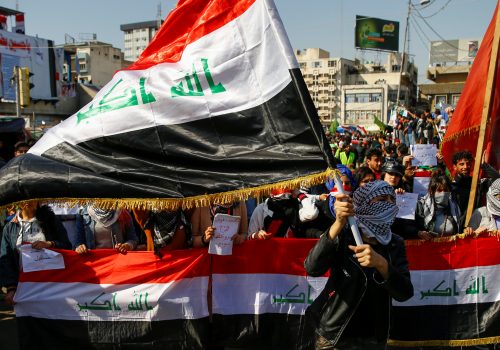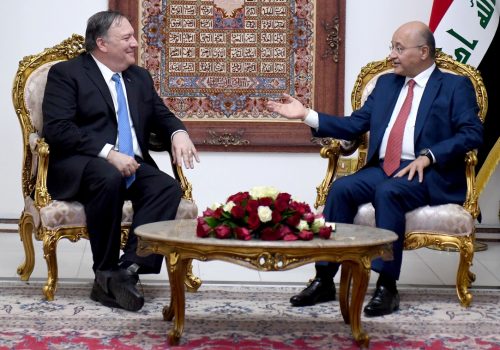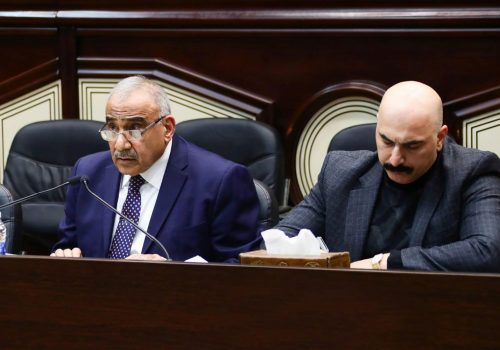How Israel is used to delegitimize Iraq’s anti-government protests
Since October 2019, the streets of Baghdad and cities throughout the Shia-majority south of Iraq have been in chaos with mass anti-government protests. More than 500 protesters have been reportedly killed and over 19,000 injured. Protesters deny receiving foreign support and many oppose the US and Iran’s role in Iraq. Instead, protestors want a united Iraq, and are motivated by their concerns over the economy and government corruption. Meanwhile, adversaries have accused protesters of sedition and even tried to link them to the United States and Israel. Attempt to tar groups as Israel-linked can be seen as an attempt to discredit them in Iraq.
While the United States looms large in Iraq—as evidenced by airstrikes on Kataib Hezbollah in December 2019 and the killing of Quds Force commander Qasem Soleimani and Kataib Hezbollah leader Abu Mahdi al-Muhandis on January 3—the accusations of Israeli involvement in Baghdad are more complex. Iranian state media often condemns Israel’s role in the region and links it to the US, portraying Iranian-backed groups as an “axis of resistance.” An examination of the ways in which Israel has been used in recent debates in Iraq is important to understanding how the protests and their opponents seek to discredit protestors in Iraq.
Israel’s involvement in Iraq can be understood through the lens of three different narratives driven by Iraqi officials and Iran-backed proxies. First, Israel likely carried out airstrikes in Iraq, resulting in condemnation from Baghdad and political leaders. Second, claims that Israel is supporting the protests are used to portray the protesters as guided or fueled by a foreign power. Third, Israel and the US has been condemned as part of a wider movement in Iraq calling for the US withdrawal from Iraq.
In July and August 2019, a series of mysterious explosions—likely caused by airstrikes—occurred at a Popular Mobilization Units (PMU) munitions warehouses in Iraq. The PMU are paramilitary groups officially incorporated into the Iraqi security forces since 2018, albeit the process having not been completed successfully. They tend to be pro-Iranian, including the Badr Organization, Asaib Ahl al-Haq (AAH), Harakat Hezbollah al-Nujaba and Kataib Hezbollah. US and Israeli sources have asserted that they play a role in Iran’s larger regional policies, linking Iranian allies in Iraq to Syria and Hezbollah in Lebanon.
In late September 2019, former Iraqi Prime Minister Adel Abdul-Mahdi blamed Israel for these airstrikes. During the same period, Harakat Hezbollah leader Akram al-Kaabi accused Israel of maintaining a base in Iraq’s autonomous Kurdistan region. The Kurdistan Regional Government denied the reports. Around the same time anti-government protesters targeted symbols of the Islamic Republic, including Iranian consulates in Karbala and Najaf, as well as the offices of various PMU groups. The controversy about Israel’s involvement in Iraq set the stage for later claims that the anti-government protestors had Israeli support.
In October 2019, Qais Khazali, the leader of AAH, and Hadi al-Amiri said Israel and the United States were behind the “sedition” of protesters Iraq. These comments were picked up by Iranian state media. In addition, Khazali claimed in December 2019 that there was a US-Israeli plot against Baghdad. His comments were reported in Iraqi and Qatari media. Khazali continued pushing his conspiracy theories on February 6, asserting that the United States and Israel were advancing a “project” in Iraq. By then Khazali had been targeted by US sanctions, accused of having a role in suppressing the protests. In Khazali’s view, the United States and Israel had prodded protesters to be more violent in order for a crackdown to ensue, thus tarnishing the image of the PMU.
Iranian state media outlet Fars News Agency also published an article in mid-December 2019 with a more convoluted argument. It asserted ties between former Iraqi commander Abdul Wahab al-Saadi and former Palestinian leader Mahmud Dahlan as part of a US-Israel-UAE plot to enable a coup in Baghdad through the protests.
As tensions in Iraq with the United States grew in December and January, the use of anti-US and anti-Israel imagery also became more pronounced. At a mass protest in Baghdad on January 24 organized by prominent political leader Muqtada al-Sadr, Israeli and US flags were trampled or denigrated. A survey of more than a hundred photos taken at the protest revealed several themes relating to Israel, including but not limited to a sign reading, “death to America and Israel;” and posters depicting the US and Israel shaking hands with the phrase, “death to America, death to Israel.”
These types of slogans are more common in Iraq and Iran on Quds Day or Jerusalem Day in May which showcase Iranian support for the Palestinians. It is also worth noting that Iraq’s parliament had voted to criminalize displaying the Israeli flag in 2017 after Kurdish referendum supporters flew it at rallies.
Israel likely stepped back from strikes on Iranian-backed groups in Iraq due to US concerns that it could feed an already tense situation. The US-led anti-Islamic State of Iraq and al-Sham (ISIS) Coalition noted in a 2019 quarterly report that suspected Israeli airstrikes resulted in Iraq’s government imposing air restrictions on all foreign aircraft, including the Coalition.
None of the allegations against Israel, or attacks on Israel’s flag, are new to Iraq. However, the linkage of Israel to recent anti-government protests and incidents in Iraq in the last six months is unique. Attempts to portray the protests as benefiting Israel or being linked to US and Israeli plots seem to have gained some traction. The assertions of various members of the PMU that Israel carried out attacks on them in the summer of 2019 have lent credence to some of the conspiracy theories. Israel will continue to be the target of Iraqi politics as the US continues to have a conflict with Iran, its militant groups, and PMUs.
Seth Frantzman is executive director of the Middle East Center for Reporting and Analysis, a former assistant professor at Al-Quds University and a Middle East analyst. He is the author of ‘After ISIS: America, Iran and the Struggle for the Middle East.’ Follow him on Twitter: @Sfrantzman.
Image: University students gather during ongoing anti-government protests in Baghdad, Iraq (Reuters)


